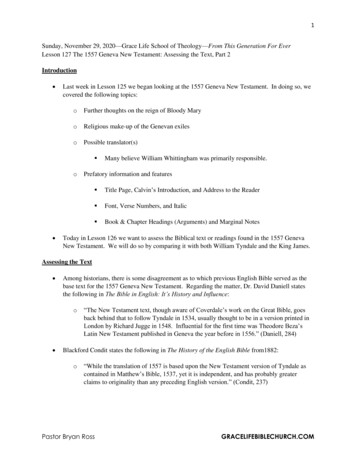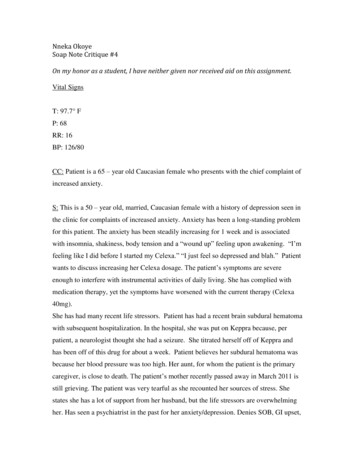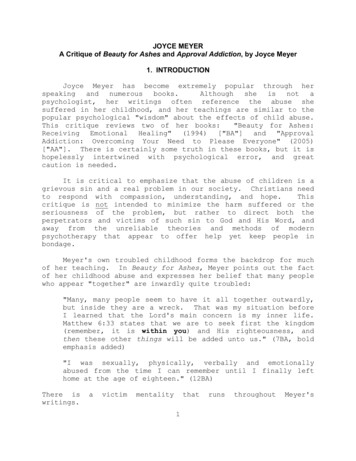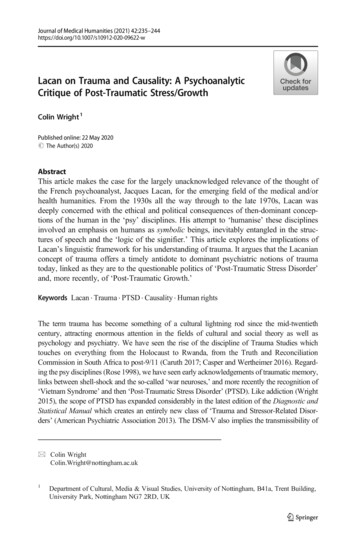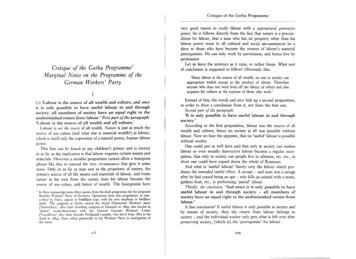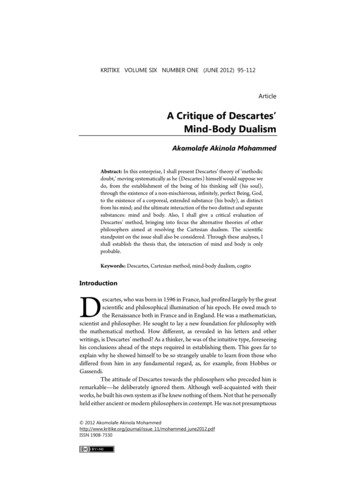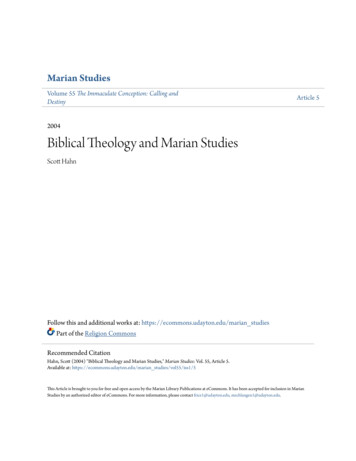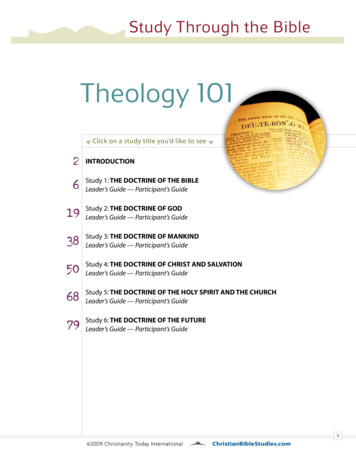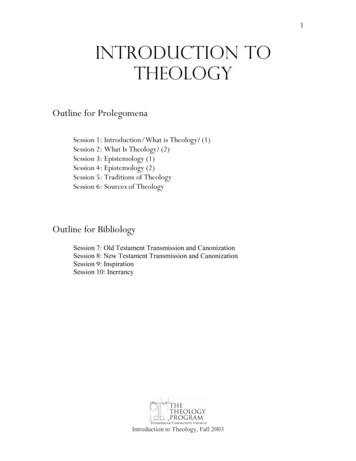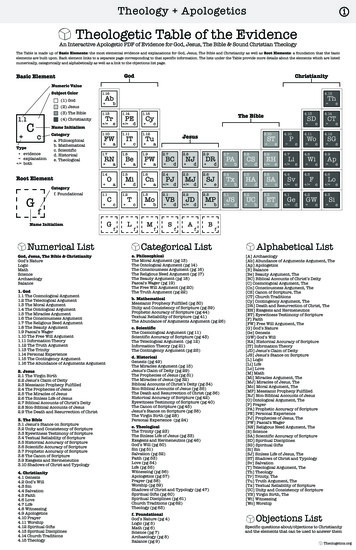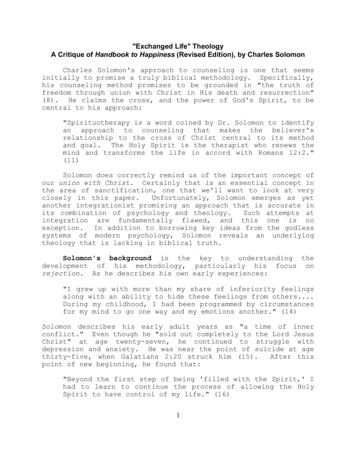
Transcription
"Exchanged Life" TheologyA Critique of Handbook to Happiness (Revised Edition), by Charles SolomonCharles Solomon's approach to counseling is one that seemsinitially to promise a truly biblical methodology. Specifically,his counseling method promises to be grounded in "the truth offreedom through union with Christ in His death and resurrection"(8). He claims the cross, and the power of God's Spirit, to becentral to his approach:"Spirituotherapy is a word coined by Dr. Solomon to identifyan approach to counseling that makes the believer'srelationship to the cross of Christ central to its methodand goal. The Holy Spirit is the therapist who renews themind and transforms the life in accord with Romans 12:2."(11)Solomon does correctly remind us of the important concept ofour union with Christ. Certainly that is an essential concept inthe area of sanctification, one that we'll want to look at veryclosely in this paper.Unfortunately, Solomon emerges as yetanother integrationist promising an approach that is accurate inits combination of psychology and theology.Such attempts atintegration are fundamentally flawed, and this one is noexception. In addition to borrowing key ideas from the godlesssystems of modern psychology, Solomon reveals an underlyingtheology that is lacking in biblical truth.Solomon's background is the key to understanding thedevelopment of his methodology, particularly his focus onrejection. As he describes his own early experiences:"I grew up with more than my share of inferiority feelingsalong with an ability to hide these feelings from others.During my childhood, I had been programmed by circumstancesfor my mind to go one way and my emotions another." (14)Solomon describes his early adult years as "a time of innerconflict." Even though he "sold out completely to the Lord JesusChrist" at age twenty-seven, he continued to struggle withdepression and anxiety. He was near the point of suicide at agethirty-five, when Galatians 2:20 struck him (15).After thispoint of new beginning, he found that:"Beyond the first step of being 'filled with the Spirit,' Ihad to learn to continue the process of allowing the HolySpirit to have control of my life." (16)1
At this time, Solomon began an extensive amount of reading,including a focus on the Pauline epistles. After seeing God sethim free from his own emotional disturbance, he decided to enterthe field of counseling, enrolling in a master's program that"was not noted for the spiritual content" (16).Integration.Although he expresses a strong desire to bethoroughly biblical, Solomon freely admits to his integration ofpsychology and theology.When he began the design of acounseling program that "would integrate the spiritual andpsychological dimensions of man," he even claims that:"Atheists, agnostics, and Jewish professors proved to bemore helpful to me than some Christians, who would try toforce me into a system that omitted or de-emphasized theeffect that our relationship to the cross of Christ is tohave on our lives." (16-17)He often found it necessary to respond to Christians who failedto appreciate his unique approach:"It was necessary to prove to critics of this method that aviable integration of counseling and the Word of God done inthe power of the Holy Spirit was sufficient to meet thedeepest needs of man." (8)God's Spirit and Word are indeed sufficient.The problem,however, lies in the "integration of counseling" with God's fullysufficient resources.Solomon admits to important similarities between hiscounseling and the "reality therapy" of William Glasser, whoconsidered bizarre behavior an ineffective attempt to meet one'sown needs, which should be met through another person (121).Spirituotherapy is approximated by substituting the Lord JesusChrist for "another person" in Glasser's therapy (122). Althoughthe substitution may indeed be critical, the differences betweenany such human system and God's truth are far deeper and moreextensive than Solomon allows.Criticisms of psychotherapy.Discernment of Solomon'swritings is particularly critical in view of the fact that heoffers scathing criticisms of modern psychotherapy at points.Such criticism tends to hide the reality of his integration.2
Near the beginning, Solomon proposes the use of biblicalterminology rather than terms based on a psychological model,because "otherwise, we come up with some vague generalities thatwill not support a true integration of psychology and theology"(26).He rightly rejects the term "mental illness" because itimplies that "the problem is in the mind" (120) and because itencourages people to disclaim responsibility for their actions(121). However, Solomon uses terms such as "neurotic" and, moreimportantly, he borrows ideas from psychological systems. Note,again, his express intention to integrate. What appears to be aunique biblical approach is ultimately exposed as yet anotherintegration.Believing God's Word and Spirit to be sufficientfor man's problems of living, integration is exactly what we wishto avoid.Solomon rightly notes trengthened to cope with those problems. Herein lies thebasic problem with psychotherapy." (46)The problem of self-centeredness is thus never handled in a godlymanner, and in fact becomes even worse.Indeed, we can agreethat this is one of the key objections to psychotherapy. Later,Solomon discusses the futility of counseling, even when strengthening of the flesh rather than "conviction of the flesh"(97). Nevertheless, he believes that a number of Christianpsychologists "do much to alleviate the suffering of emotionallydisturbed people, returning many of them to a fuller life" (119).However, he acknowledges that their approach is deceptive becauseit strengthens self rather than fostering dependence on God.Furthermore, psychologists assume that changes in thinkingand behavior actually change the person. Solomon only partiallyagrees:"It is one thing to help a person understand the dynamics ofhis thoughts, emotions, and behavior, but it is entirelyanother thing to use psychological principles exclusively toattempt psychological and behavioral change." (119)Solomon is not entirely consistent. He is evidently willing tomake use of psychological categories for the understanding ofhuman nature, while claiming to utilize fully biblical solutionsfor the problems that are uncovered. What we need is a biblical3
understanding of man's problems and solutions grounded solely inGod's truth and power.Another criticism to be noted is Solomon's awareness ofFreud's hostility to God, and the fact that his counterfeitapproach has undermined morality in this century (118).Thisrecognition is good, but it obscures Solomon's reliance on theimpact of early childhood experiences, particularly rejection.On this issue his teachings are similar to Freud.In fact,Solomon believes that many--even most--psychological problems donot have a spiritual origin, but rather result from earlychildhood or major traumas (123).Psychology, he says, may behelpful in the understanding of behavior that follows (123).Nevertheless, psychotherapy is often counterproductive in that itonly provides relief for symptoms (123).What Solomon advocatesis not a human therapist to do the work of transformation, butthe Holy Spirit, "the Master Therapist" (123). What we have hereis a dangerous mixture of psychological and biblical categories.Solomon also notes the fact that many seminaries maintain anorthodox theology but, inconsistently, adopt an antitheticalapproach to human nature in their counseling (119).Thissituation definitely does need to be addressed. As we will seein this paper, sound theology is essential to helping people withtheir problems.The therapeutic relationship is yet another issue whereSolomon rightly sees problems.He states that "the counselormust provide the example by casting himself completely upon theLord even in the matter of salary" (124). Conventional therapymaintains "the professional facade of the therapist-clientrelationship," yet psychiatrists have the highest rate of suicidefor any profession (124).Certainly, the "professional"relationship is anything but biblical in nature, and the chargingof fees for ministry is an unbiblical practice.Referrals outside the local church are yet another matterwhere valid problems are identified. Solomon believes that aboutninety percent of all Christians do not experience the "abundantlife" because:"They do not understand how deep psychological problems canbe resolved by letting the Lord Jesus Christ manifest hislife in them, instead of resorting to human therapy." (124)Meanwhile, believers are referred outside the church to"professionals." We must agree that believers should not be sent4
outside the church for counseling!However, many today bringpsychological explanations and solutions into the church.Unfortunately, Solomon must be counted among them.What "spirituotherapy" is not. Solomon responds to severalcriticisms and misunderstandings of his counseling. Although hedoes this at the very end of his book, we need to consider theseat the outset. Contrary to what some have said, Solomon statesthat he does not teach the annihilation of the personality,sinless perfection, or the believer's atonement for his own sins(116). He also denies teaching "that rejection is the reason wemust go to the cross" (116). Another accusation Solomon deniesis that he teaches passivity (117).Although the above are not the specific problems withSolomon's teachings, and we want to accept his word for what hedoes not teach, there are problems. Rejection does not replacesin, but Solomon's emphasis on its influence does not matchScripture. Passivity is indeed not taught, but we will encounteran "aggressive yielding" that comes close, in some ways, to aworks-oriented approach. The believer does not atone for his ownsins, but Solomon's view of the necessity of suffering tends toat least blur the completed work of Christ in some sense.Sinless perfection is not taught, but Solomon does propose asecond experience, distinct from salvation, that is necessary forthe "abundant life."The individual personality is notannihilated, but Solomon does not clearly articulate the biblicalview of what it means to be "in Christ" in His death andresurrection. These are among the problems we will examine.The "experience of the cross" compared to various modernapproaches.Here is the central concept for Solomon'scounseling. He believes that "the experience of the cross is anongoing process," that "we are all in the process of becoming inexperience who we already are in Christ by position" (17).However, according to Solomon, all of the modern approaches toChristian counseling omit the message of the cross:"The message of the cross, with its emphasis on death to thepower of sin, is not a popular message today." (115)It is unpopular with both secular and Christian approaches.Solomon describes various secular approaches as "the havioral,insight-oriented, and transpersonal (chart on p. 126). e,gestalt,rational/emotive, behavioral, insight, eclectic) are termed "the5
cross denied" (126).In Christian theological approaches, thecross is either implied or applied (126). The former emphasizesobedience to scriptural principles, "doing in order to be," whilethe latter focuses on the transforming work of the Holy Spirit inrenewing the mind, "being in order to do" (126). This is whereSolomon places his own counseling method. Our task in this paperis to examine it thoroughly, particularly in terms of theunderlying theology.Solomon's View of ManIt is important, as we begin, to consider Solomon's basicview of the nature of man. This is critical to understanding andevaluating his counseling approach.Trichotomy. Solomon's view of man is trichotomous, restingprimarily on 1 Thessalonians 5:23 and Hebrews 4:12. He teachesthat "other references also seem to support the assertion thatman has a spirit that functions as a separate entity" (25). Forexample, he states that in 1 Corinthians 6:17, "obviously, thisspeaks of a union of the spirit as opposed to a union of thesoul" (26).When Jesus dismissed His spirit, according toSolomon, this was "an act of the soul" (26, emphasis added). Hegoes on to say that the dichotomous view "does not allow for aspirit in man," and it is this spirit that distinguishes man fromthe animals (26).Basically, Solomon teaches that:1.2.3.Man is a spirit.Man has a soul.Man lives in a body (26).This can hardly be overemphasized, as Solomon warns readers that:"It is vital that this entire book be read with thisunderstanding, since some statements could be misconstruedif applied to any other than a trichotomous (tripartite)view of man." (26)This requires close analysis.Although I would hesitate toaccuse Solomon of the dualism that is present in Gnosticism,where matter is viewed as evil and only the "spiritual" is"real," this comes perilously close. We ought to state that manis body as well as soul/spirit. The body is an integral aspectof man.The believer is promised a glorified, resurrectedphysical body (1 Corinthians 15), not an eternal existence6
floating in the heavens as pure spirit. The separation of bodyand soul is the wages of sin (Romans 6:23). The spirit is notimprisoned in the body, as in pagan dualism.Further explanation, using two diagrams (27, 29) indicatesthe functions that Solomon proposes for the three parts of man:1.Man's soul (mind, emotions, will) relates to otherpeople.2. Man's spirit relates to God.3. Man's body relates to the environment.All of this raises a string of critical questions.How wouldSolomon handle the command to love the Lord your God with allyour heart, soul, mind, and strength (Deuteronomy 6:5, Matthew22:37)? Is God unconcerned with body and soul, in view of ourpromised resurrection bodies (1 Corinthians 15)?If the soul,which includes the mind, relates to man and not to God, how isthe revelation of Scripture to be received and studied? Is thebody totally unrelated to others, for example, in the sexualunion between man and wife?Is the spirit not a part of therelationships between believers in the body of Christ (Ephesians4:3-4)?Scripture does not support the sharp division of manproposed by Solomon. Man is much more a unity.Solomon correctly states that Adam was created in God'simage, that he was innocent and able to communicate with Godprior to the fall. He says that:"Though the spirit of Adam is not mentioned specifically, weread, 'The Lord God formed man of the dust of the ground,and breathed into his nostrils the breath of life (orlives), and man became a living soul' (Genesis 2:7)." (27)We should view this as the impartation of the Holy Spirit. Atthe fall, man lost the indwelling Spirit of God.Notice here,too, the use of the word soul.Sometimes, "soul" is used todescribed a living, animated being, either man or animal. Yet atother times, it describes the immaterial aspect of man incontrast to the body (Matthew 6:25; 10:28). In some texts, theterm "spirit" describes the immaterial aspect of man in a similarmanner (1 Corinthians 7:34; 2 Corinthians 7:1).In these fourtexts, "body and soul" or "body and spirit" are used to describethe complete person, either the completeness of eternaldestruction (in Matthew) or the completeness of sanctification(in Corinthians).If an integral component were omitted, thedescription would be incomplete. Thus, the terms soul and spirit7
are used in varied and complex ways throughout the Scriptures.There is not the neat division that Solomon proposes.Furthermore, some Scriptures explicitly refer to the inner man incontrast to the outer man, the body. In 2 Corinthians 4:16-5:10,the outer man is decaying while the inner man is being renewed.In Ephesians 3:16, the inner man is strengthened.This clearduality is the more frequent occurrence in Scripture, rather thanthe spurious trichotomy advanced by Solomon.In addition, Solomon does not provide us an exegesis ofeither Hebrews 4:12 or 1 Thessalonians 5:23 to support his thesisof trichotomy.Neither text proposes to actually teachtrichotomy. Rather, in each one terms are piled up in order toconvey the notion of the whole person.Paul assures theThessalonians that God will sanctify the believer completely, inhis whole being.The writer to the Hebrews emphasizes theactive, penetrating power of God's Word, which is able to exposethe innermost thoughts and intentions of the entire inner man.Such piling up of terms occurs elsewhere in Scripture and shouldnot be taken as definitive of the "parts" of man. When the termsheart, soul, mind, and strength are placed together in thecommand of Deuteronomy 6:5, it is obvious that the whole personis meant.Otherwise, we would be forced into a four-partdivision of man that makes little sense (or even a six-partdivision, if body and spirit were added!).Furthermore, the verse in Hebrews 4 uses a Greek verb,merizo, which means to divide within a thing, not to dividebetween that thing and something else. Joints and marrow are notadjacent so as to require a sharp sword between them.Rather,these represent the most inaccessible parts of our physicalbeing.The piercing sword of God's Word is so powerful as topenetrate the innermost recesses of the inner man, the thoughtsand intentions of the heart.That sword does not divide theinner man into two distinct parts, but rather divides within thewhole.1The implications here can hardly be overstated.When theinner man is divided, the psychologist lays claim to the soulwhile leaving the spirit to the care of the pastor.Thesufficiency of God's Word and Spirit for the entire inner man is1There is much more that could and should be said!I am indebted here toJohn Murray for his chapter on trichotomy in Collected Writings of JohnMurray, Volume II (Edinburgh: Banner of Truth Trust, 1977), p. 23-33; also toJay E. Adams, A Theology of Christian Counseling (Grand Rapids: Zondervan,1979), p. 110-116.8
undermined.Not only is trichotomy unbiblical; it leads tothoroughly unbiblical practices in helping people change.Sin.Solomon's teachings about sin, while not entirelyunbiblical, are lacking.First of all, Solomon notes that spiritual death, ratherthan physical death, resulted when Adam sinned:"Their soulscontinued to function psychologically" (28).Spiritual deathindeed resulted, but it is also true that physical death resultedfrom the fall. It may not have been immediate, but it did happen(Romans 5:12ff). Solomon may not have intended to specificallydeny that physical death is the result of sin, but that is theimplication of what he says. To deny that result is to discountthe gravity of sin and its consequences.Self-centeredness is a key result of the fall in Solomon'steaching. He says that Adam and Eve, after the Fall, began tofunction in a different sphere, with their spirits functioning"toward Satan instead of God" (30)."Man after the Fall was flesh, meaning that from that pointon he lived a self-centered life. Adam positionally becameflesh or self-centered and each of us is born into the worldwith the same dilemma (Romans 5:12)." (29)Solomon notes that he will be using the terms "flesh" and "self"interchangeably throughout the book "when referring to thecontrol center of a believer living out of his own resources"(29).Note, however, that his use does not coincide with thescriptural use of the term "flesh."Sometimes, "flesh" hassinful connotations in the Bible, but not always. It is helpfulto know how Solomon will use particular words, but unfortunately,it is rather confusing when he redefines a word used sofrequently in Scripture.Man is indeed self-centered, but this description is notadequate to describe the full impact of sin. Sin separated manfrom God. It involves the transgression of God's commands, theexchange of the worship of God for the worship of created things.Sin is a moral evil involving both guilt and pollution. Solomondoes not deny the reality of sin, but he lacks clarity.This lack of clarity emerges when Solomon equates self withsoul (mind, will, emotions), which "in and of itself, is neutral"(37).However, there is no such neutrality.Adam was createdgood and upright, morally excellent (Genesis 1:31).Since the9
fall, sin pollutes the mind, will, and emotions.time is the inner man ever morally neutral.At no point inSolomon's weakness in the arena of sin also shows itselfwhen he presents man as more a victim than a sinner:"As long as self is in control, the functions of the soulwill operate in direct correspondence to the historicalevents that have characterized our maturation, and these maybe worsened by the ways we have attempted to meet our ownneeds." (39)Such a statement obscures personal responsibility for sinfulactions, which appear to be dependent on "historical events."Inferiority, insecurity, inadequacy, and guilt are allfeelings that Solomon discusses as problems arising from withinman's soul (39-41).The first three retain the focus on selfthat Solomon claims to avoid in his "exchanged life" theology.Furthermore, biblically defined guilt is not a feeling!Thediscussion veers even further away from biblical definitions when"imaginary guilt" is distinguished from "real guilt" (sin).This, according to Solomon, "feels exactly the same as realguilt" but "may spring from a lack of love and acceptance" (41).He contends that repeated confession fails to solve the problemand it may persist throughout one's life (41). God's Word is thestandard by which guilt is determined.There is no need toresort to a psychological category, "imaginary guilt," based onfeeling rather than fact. The whole issue of sin and guilt isseriously confused by the introduction of this unbiblicalsubdivision.that:In spite of these weaknesses, Solomon does correctly affirm"We were in Adam positionally when he sinned.made us sinners from birth." (48)This is whatIndeed, it is true that "all sinned" (Romans 5:12) when Adamsinned, because he is our covenant representative. In the sameway, believers are "in Christ." His righteousness is imputed tothe Christian, just as Adam's sin is imputed to the entire race(Romans 5:12-21). Solomon is not crystal clear about the notionof imputation, but he does affirm that Adam's sin impacted allhuman beings.He affirms that we sin because we are sinners,born with a sin nature (48).10
Rejection.Solomon's weak view of sin is particularlyevident when he brings in the notion of rejection.This isperhaps the cornerstone of his approach to counseling. He placesa huge emphasis on the impact of rejection, defined as "theabsence of meaningful love," in his counseling (18). This needsclose examination, because it is so similar to much of the victimtheology we find in contemporary "Christian" psychotherapy.Solomon notes that many of his counselees had been openlyrejected by their parents, while others, having experienced amore subtle rejection, had "just as much emotional damage" butwere "unaware of the source" (18). Solomon doesn't hesitate touse the psychological term "inferiority complex" in describingone of the results of rejection (18).Rejection, according to Solomon, may include parental deathor divorce, or even time spent in an incubator prior to thedevelopment of conscious memories (19):"One woman with whom I spoke, who had been in an incubatorfor the first three months of her life, could not accept thefact that her parents loved her at all until she was twentythree years old. Obviously, she was not lying there in theincubator thinking that her parents hated her; but the voidthat was built into her emotions over the time spent in theincubator prevented her from receiving her parents' love,which was there in abundance.She received love butperceived or felt rejection." (19)This has an unmistakable Freudian ring to it, despite Solomon'srecognition of Freud's atheism.Such determinism blursresponsibility for personal sin.The results of rejection, according to Solomon, include "theimpaired ability to give and receive love" (18), in addition tothe rejection of self:"A person who suffers from rejection will oftenhimself in some facet of his personality." (20)rejectHe may also reject and blame others (20).Blame-shifting andfailure to love others are real problems addressed in Scripture,but rejection of self is never asserted as a biblical issue. Onthe contrary, man naturally loves and cherishes his own flesh(Ephesians 5:29).If self-rejection were truly the underlyingproblem for so many people, God would have addressed that problemin His sufficient Word.11
Solomon's answer to rejection is acceptance, but "humanacceptance.will not heal the damaged emotions after rejectionhas done its dirty work" (20). Only acceptance in Christ will dothe job. This sounds good. It even sounds biblical, because Goddoes accept the believer "in Christ," on the basis of Hiscompleted work on the cross.God reconciles man to Himself,removing His enmity toward sinful man.However, it is God's wrath that is propitiated (Romans 3:25;1 John 2:2, 4:10). It is God's anger toward man's sin that isremoved, not man's anger toward himself.Psychologicalexplanations shift the focus away from God, His righteousness andHis justice. Rather than being reconciled to a holy God, man isreconciled to self. That is the focal point of psychology, evenwhere man's reconciliation to God is acknowledged.In this fallen world, all of us experience rejection.Indeed, some people are grievously sinned against, being rejectedeven by their own parents and families. There is no intent hereto minimize the hurt that is experienced. However, focusing onthe rejection of other fallen human beings, as the driving forcebehind adult behavior, diverts us from the biblical doctrine ofsin and the glory of our reconciliation to God in Christ.Identity.Herecounseling methods.isanotherkeytounlockingSolomon's"Many believers live with an identity that has been assignedto them, either positive or negative, depending on theextent of rejection, or with an identity they have built forthemselves." (21)However, "our true identity is based on who we are in Christ"(21) The solution involves:".exchanging the identity based on our personal historyand the influence of indwelling sin for our perfect identityin Christ." (21)Again, Solomon sounds biblical because he bases his answer on theLord rather than on worldly, temporal solutions.He citesEphesians 1:17-20, where God's resurrection power operates in thebeliever:"Each of us must define our identity and look at it squarelyto understand that which we must lose if we are to live outour true identity in the Lord Jesus Christ." (23)12
Solomon believes that identity, either assigned by others orcreated by self, has a powerful impact on our decisions andrelationships with others (25). He sees it as one of the majorforces driving sinful behavior:"While it is important to understand the psychological andinterpersonal conflict that might be troubling us, it ismuch more important to get behind them and deal with thereal issue--the identity out of which we are living thattends to perpetuate the self-defeating thoughts, feelings,and behaviors." (93)"Loss of identity can be totally demoralizing, depressing,and can even result in psychotic episodes." (100)Solomon sees the solution to this disaster in an exchange ofidentities:"Losing identity with nothing to replace it can causemassive damage to the self concept and few can tolerate it.However, God does not ask us just to lose our identity butto exchange it for one that will work both for time andeternity." (101)Solomon cites John 12:24-25 for support, along with Matthew16:25, stating that in these texts:"I do not believe it isdoing violence to Scripture to substitute the word identity forlife" (101).In John 12:24, Jesus refers to His own approaching death onthe cross, for our sins.In the next verse, believers areexhorted to be willing to lose their lives (souls) for the causeof Christ, having been promised eternal life with the Lord. Thefocus is on serving and glorifying God, not on having a personalidentity to guard one's self-concept or to prevent "psychosis."Solomon appears to be focused on biblical truth about commitmentto Christ, but in a subtle manner he remains centered on self.Solomon's View of SalvationSolomon's weakened view of sin, not surprisingly, isaccompanied by an unbiblically high view of man's ability and"free will," particularly in the crucial area of salvation.God's role in salvation (and sanctification) is presented asgenerally passive, waiting for man to make the first move:13
"He meets those who are willing to meet him. His promise isthat he will draw near to us if we draw near to him (James4:8). However, he doesn't promise to chase us down!" (80)This is not what Jesus says in John 6:44. There He informs usthat no man is able to come to Him unless God the Father drawshim.Faith is represented in Scripture as God's gift, not ofourselves in any manner (Ephesians 2:7-9). God is sovereign andactive in salvation. He initiates it and He completes it.Solomon explains salvation, "being born again," as enteringinto a personal relationship with God through faith in JesusChrist. He says that:".before we trust the Lord Jesus Christ in a personalsurrender, the Holy Spirit must convince us that we are bornsinners. When we are ready to admit that we are ungodlyand to believe on the Lord Jesus Christ, then we will bejustified and counted righteous in God's sight.upon thebasis of his infallible Word, he saves us when we believeand call upon him." :repentance, faith, and justification. Faith and repentance aretwin graces in the application of our redemption, and they arefollowed simultaneously by our justification. God decl
orthodox theology but, inconsistently, adopt an antithetical approach to human nature in their counseling (119). This situation definitely does need to be addressed. As we will see in this paper, sound theology is essential to helping people with their problems. The therapeutic relationship
